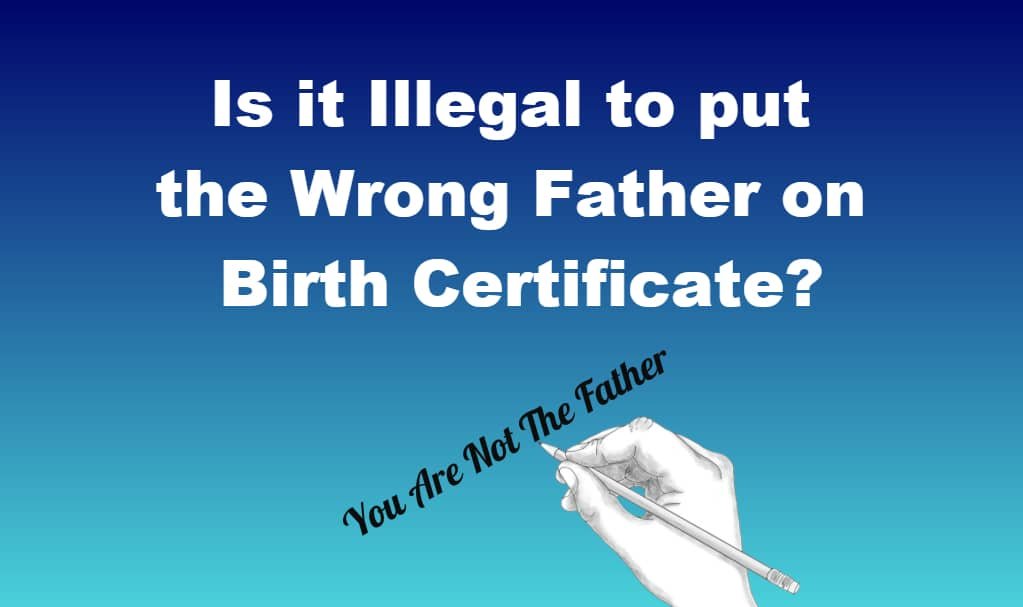
Yes, it is illegal if an alleged father’s name was added without his consent. This type of fraud is also known as paternity fraud which falls under forgery. Signing someone’s name to a document is also known as a False Document. Forgery is a criminal offense in all of the U.S. states. Each state does handle this offense differently.
Many times this type of fraud occurs in a situation where a mother names a man to be the biological father, yet she knows that he is not. Paternity fraud is very common here in the U.S. but is seldom discussed. Often times the mother of the child will choose the man she deems the most responsible person and sign his name on the birth certificate.
In other instances, some mothers will sign a father’s name on the birth certificate to receive future state benefits. Regardless, of the mother’s reason. Signing someone else’s name to a document without consent is considered fraud.
Although, it is illegal to forge someone else’s name without their consent. Most of the time mothers are not convicted of this crime.
How does this Happen?
When a woman wrongly puts the father’s name on the birth certificate, he is asked to sign an affidavit of a child that he isn’t biologically connected to. In most cases, it’s usually the mother who urges the man to sign the birth certificate form. The problem mostly arises when the court uses that birth certificate as evidence in cases of child support care. As a result, some men innocently pay for child support on behalf of children that aren’t biologically theirs.
How to Reveal this Fraud?
The paternity fraud at times lingers for years without anyone detecting it. However, later in life, it manages to come to light. Mostly through medical records that show the child isn’t biologically related to the man.
In the case where a man is paying for child support to a child who isn’t biologically his. The court is left to decide on the way forward. Nevertheless, the court mostly rules in favor of the child. The man may be asked to continue paying child support.
The Fate of the Father and Mother
The fathers who are victims can always go to court to ask for their child support funds back from the mother. Nevertheless, the chances of him getting his money back are quite slim.
Despite this kind of fraud being illegal, it’s not punishable by the law. Plus, it’s quite challenging to recollect money from a mother who committed paternity fraud. Nevertheless, in previous cases, men have been given compensation when DNA results show that they aren’t biological fathers.
Any parent that suspects that his fellow parent has committed paternity fraud should immediately ask for a DNA test. Plus, he should seek an attorney to aid him in obtaining child support reimbursement funds.
How to remove a non-biological father from a birth certificate?
If a mother or a true biological father of a child wants to remove the non-biological father’s name from a birth certificate. The first step in the process is to provide proof that the man whose name is on the birth certificate is not the father. This can be done by performing a paternity test.
Many times there can be roadblocks to executing this process. The most frequently experienced roadblock is when a biological father and mother do not get along. The biological father may want to be in the child’s life and wants his name on the birth certificate. Some mothers will deny the biological father the right to perform a DNA test to provide proof. Normally the biological fathers are not custodial parents. Only custodial parents have the right to make decisions for their children. If you fall into the category of the non-custodial parent. The biological father will have to file a petition with the court requesting a paternity test be performed.
Once the proof has been provided by way of a paternity test. The alleged father and/or mother may reach out to vital records in your respective state to inquire about the necessary documentation needed to complete this process. It is vital records that oversee the process of the name change and amending of a birth certificate if the paternity acknowledgment needs to be amended.
If you are in need of a paternity test and you are uncertain about the process you can pick up a copy of the new book “Are You? Or Are You Not The Father: The How to Question and Answer Guide to on Paternity Testing Process” here today.
Changing a name on a birth certificate?
One question many people often wonder is, Can I change the name on my birth certificate? The answer, of course, is, Yes! In order to perform this task, it will require permission from a court of law. This basically means a Judge will be involved and he or she will have to give consent to altering a Vital Records birth certificate.
Step 1
The first step in changing or altering the name on your birth certificate is to contact your county’s courthouse or check your state’s vital record’s website to review their protocol for handling this process. Get the necessary forms to file a petition with the court to request permission for a name change. Normally, when you file the forms with the court. The clerk at the courthouse will give you a date to appear before the Judge.
Step 2
The next step in the process is to appear before the Judge at the assigned date and time. Explain to the Judge your reasons for wanting to have your name changed on your birth certificate. If the Judge deems the reason you provided acceptable for change, the Judge will allow your name change request and give you an order. Upon receiving your order, please request an additional certified copy. Note, a certified copy is one bearing the Judge’s signature with your state’s official seal.
Step 3
The next thing you will need to do is, contact the Vital Records Department in your state. As mentioned briefly in step one, Make sure you acquire and complete new birth certificates or name change forms or applications needed for this process. It is important you fill out these documents with the new name you were granted through the courts. Also, you may want to make sure you know if there are any associated fees for this process to alleviate any surprises ahead of time.
Step 4
Now that you completed your application, have the original copy of your court order and the associated fees for Vital Records. It is also important that I mention you add a copy of your birth certificate that will better assist Vital Records to identify your case. Please note, most states do not accept copies of the court order. It would be in your best interest to check with Vital Records to be sure if you can send a copy of the court order. When mailing your documents to Vital Records, you may want to mail your documents with some form of certified tracking or priority mail.
Step 5.
Finally, after shipping out your documents, check your tracking details about a week later to verify receipt and, to allow Vital records to process your documents. If the receipt is confirmed by way of your tracking number you can attempt to contact Vital Records to verify the turnaround time for you to receive your amended birth certificate.
Sometimes, the turnaround times can be located on your state’s Vital Records website.
Do I need a DNA Test to change the name on a birth certificate?
There are various reasons one may want to change the name on a birth certificate. One of the most frequently growing reasons for changing a name on a birth certificate is due to having the wrong biological father on the birth certificate.
If this is your situation, then you probably can expect to perform a legal paternity test to be performed by an Accredited lab and/or company that provide legally accredited DNA testing services like IDTO DNA Test Center.
Nonetheless, you will have to first file a petition with the court to acknowledge paternity. If the judge finds the evidence acceptable he or she will grant you, the non-custodial parent the DNA Test. If the alleged father is the biological father of the child. The DNA Test can use as evidence of proof of a biological relationship when filling out the Vital Records birth certificate name change paperwork.
Please make sure you consult with your state Vital Records department for their entire protocol for this specific process. If you are for any reason are unsure about the paternity testing process please check out my new e-book on Amazon Are You? Or, Are You Not The Father? The Complete Question and Answer Guide To Paternity Testing. This way you will be armed with all of the information you need to know before beginning paternity as pertains to your specific situation.
Legal Father vs Biological Father
Many people are confused about what the difference is between a legal father and, a biological father. Below, we will discuss the differences between the two.
Legal Father
A Legal Father does not have to be biologically related to a child to be deemed a legal father. An example of a non-biological father being a legal father is, a man, who is married and his wife cheats on him and, she becomes pregnant by the man she slept with outside of her marriage.
Husbands are automatically deemed legal fathers regardless of whether a child is biologically related to him or not.
Biological Father
A biological father can be a legal father but does not mean he is a legal father in some instances. Being a biological father basically means you contributed your DNA to a child.
Being biologically related to a child does not automatically give a biological father legal rights over a child’s well-being. The state will not deem a biological father a legal father unless he signs an acknowledgment of paternity form or he is married to the mother before conception.
